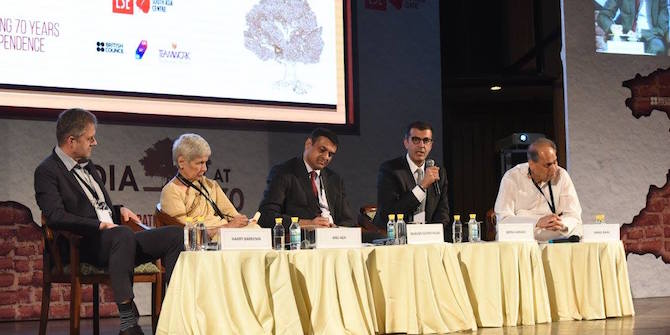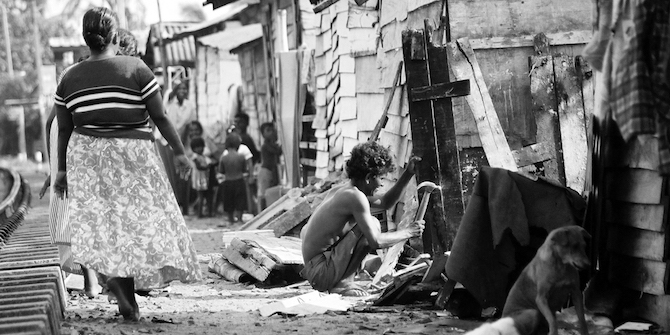In conversation with Prime Minister’s Rural Development Fellow Belmati Jonko, Bahrin Bhuyinya, a resident of the Khunti district in Jharkhand, shares her story. While she feels that the village has benefitted from government schemes in the past decade, it is the increased involvement of women in the village panchayat that has truly empowered Bhuyinya and others like her. This is the second narrative in a three-part series on what development means to women in some of the most remote parts of India. This post first appeared on the Ideas for India blog.
The village of Kenbanki is nestled in the foothills of dense forest hills of Khunti district of Jharkhand. It is populated by the ‘Munda’ tribal community and a majority are marginal and small farmers who have few opportunities for full-time employment in their fields. As it is a rain-fed area, agricultural activity is seasonal and ceases altogether in winter. Many of the villagers therefore eke out a living by migrating to cities as wage labourers in the off-season.
During a recent visit to Kenbanki, a lady in a traditional tribal sari caught my attention. She was busy placing mahua flowers in a basket, with her children by her side. She introduced herself as Bahrin Bhuyinya, and said that she lives with her husband, four children, and parents-in-law. Her family owns six acres of land where they can only cultivate paddy in the rainy season as they don’t have any irrigation sources near their fields.
In the past, produce from the land was insufficient to meet the needs of her family so Bhuyinya and her husband would work in the fields of marginal famers. However, low agricultural wages meant that even this was not enough. The Mahatma Gandhi National Rural Employment Guarantee Act (MGNREGA) came as solution for the family as it promised 100 days of employment. But due to late payments (sometimes no payment), lack of information about the process of getting employment, and lower wages compared to private contractors, her family had to look for more lucrative opportunities elsewhere. In recent years, her husband has taken to migrating to the nearest city in the off-season.
In Bhuyinya’s view, the village has changed a lot in past few decades. In 2002, a MGNREGA-funded road was built to connect the village to the main National Highway, which has greatly increased accessibility. Villagers are now more cognisant as compared to the last decade and many other schemes have also reached the area. Since Bhuyinya is a Below Poverty Line (BPL) card holder, her family is on the preference list of beneficiaries for various schemes and this has brought about a significant change in her life. In addition to MGNREGA, she is a beneficiary of the Indira Awas Yojana (IAY), Public Distribution System (PDS), medical facilities, and free schooling. A piece of waste land belonging to her family was leveled under MGNREGA and is now cultivable.
The introduction of a sahiya, who acts as a facilitator in the healthcare system in the village, has been a relief as she is now a vital source of information for all the medical facilities that can be availed from the Primary Health Centre. As the sahiya hails from the community, the villagers have faith in her and she has introduced them to different facilities such as institutional delivery, Ladli Laxmi Yojna, Polio Day, etc.
Bhuyinya puts forward a different view on Naxalism as compared to the common perception. She feels it has been useful for her family as her husband used to be an alcoholic. This would result in regular scuffles in the family. “Naxal bhais have helped eradicate alcoholism completely from the village by punishing both the consumers and suppliers of alcohol. However, the villagers have been made to follow their orders whether or not they agreed with them and this has brought about suffering for some families.”
Ever since a lady was elected as mukhiya (elected representative in the village panchayat), Bhuyinya and the other women in her village feel more confident expressing their views about the development aspects of village, and demanding basic necessities for women. Bhuyinya herself has started to participate in the Gram Sabha more frequently. The stake of women is also increasing in the economic affairs of the family. Bhuyinya ventured to join a women’s group run by the government under the Swaranajayanti Gram Swarozgar Yojana (SGSY), and enrolled her children in school. The group began trading forest produce as their main activity using the revolving fund they received. They earned a profit of 10,000 rupees in the first three-month period selling 30 kilogrammes of mahua at high rates in the off-season.
Bhuyinya is very hopeful for a better future as her children are going to school and benefit from the PDS and medical facilities. Women in Kenbanki believe that further development of the region is possible only if women can contribute to the success of their family and community.
On Friday, Basanti Naik from Odisha shares her success story in the final installment of this series on women and development in India. Click here to read about women and development in West Bengal.
Belmati Jonko is a Prime Minister’s Rural Development Fellow under the Ministry of Rural Development, working in Khunti, Jharkhand. Her primary area of focus is NRLM, initiating livelihood opportunities for lac farmers by organising them into cooperative, model villages (state-sponsored scheme), MGNREGA and RANIA and BIRBANKI Action Plan.









The linking of public programmes and policies like the MGNREGA, the IAY, the SJGSY or Aajeevika, etc. to the Gram Panchayats, along with some of state governments’ innovative ideas like Kerala’s Kudumbshree Yojna, are creating more room for women inclusion in the process of development.
Panchayati Raj is in nascent phase in Jharkhand, which is giving a space for women to standout as a leader and exposure to good practices has given them a new perspective to develop a route towards their empowerment.